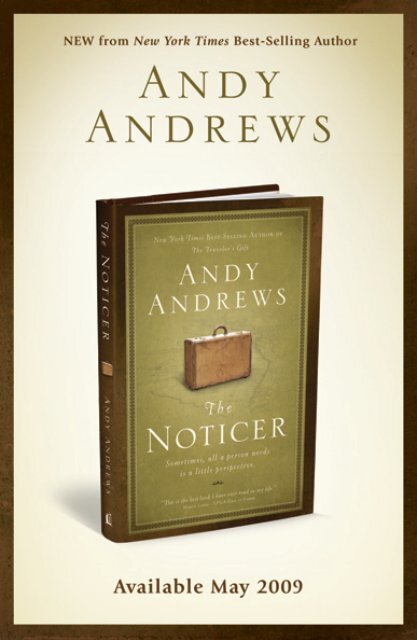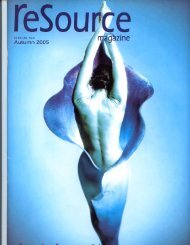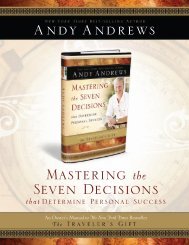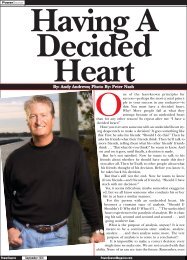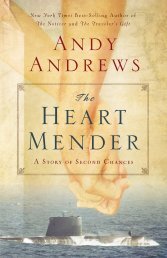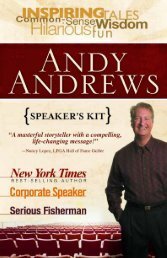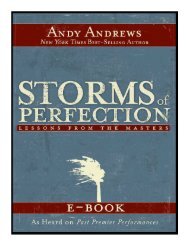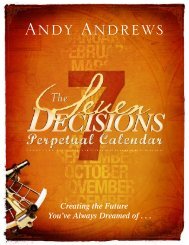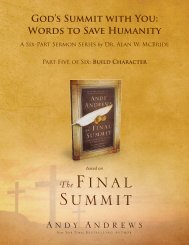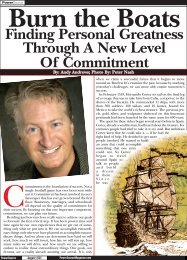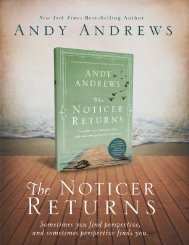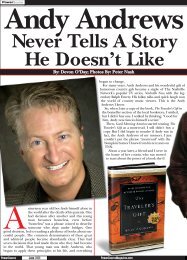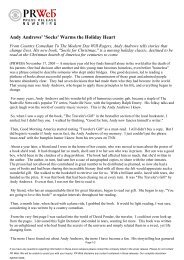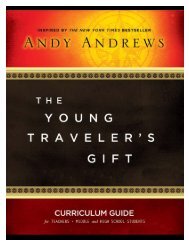The Noticer Chapter 1 - Andy Andrews
The Noticer Chapter 1 - Andy Andrews
The Noticer Chapter 1 - Andy Andrews
Create successful ePaper yourself
Turn your PDF publications into a flip-book with our unique Google optimized e-Paper software.
<strong>Chapter</strong> 1<br />
His name was Jones. At least, that’s what I called<br />
him. Not Mr. Jones . . . just Jones. He called me “young man” or<br />
“son.” And I rarely heard him call anyone else by name either. It<br />
was always young man or young lady, child or son.<br />
He was old, but the kind of old that is difficult to quantify.<br />
Was he sixty-five or eighty—or a hundred and eighty? And<br />
every single time I ever laid eyes on him, he had an old, brown<br />
suitcase close at hand.<br />
Me? I was twenty-three when I saw him for the first time.<br />
He held out his hand, and for some reason, I took it. Looking<br />
back on the moment, I think that act in itself was a small miracle.<br />
Any other time, and with any other person, considering<br />
my circumstances, I might have cowered in fear or come out<br />
with my fists flying.<br />
1
<strong>Andy</strong> <strong>Andrews</strong><br />
I had been crying, and he heard me, I guess. My cries were not<br />
the muffled sobs of loneliness or the whimpering of discomfort—<br />
though certainly I was lonely and uncomfortable—but the<br />
anguished wail that a guy will let loose only when he is sure<br />
there is no one around to hear him. And I was sure. Wrong, obviously,<br />
but sure. At least as sure as one spending another night<br />
under a pier can be.<br />
My mother had succumbed to cancer several years earlier, a<br />
tragic event in my life that was compounded shortly there after<br />
by my father, who, neglecting to wear his seat belt, managed to<br />
chase my mother into the afterlife by way of an otherwise survivable<br />
automobile accident.<br />
One questionable decision followed another during the confused<br />
aftermath of what I saw as “my abandonment,” and within<br />
a couple of years, I found myself on the Gulf Coast, without a<br />
home, a vehicle, or the financial means to obtain either. I did odd<br />
jobs—mostly cleaning fish on the piers or selling bait to the<br />
tourists—and showered at the beach or swam myself clean in a<br />
pool at one of the hotels.<br />
If it was cold, there was always a garage left open in one of<br />
the many empty vacation homes that dotted the beach. Rich<br />
people (anyone who owned a vacation home), I soon learned,<br />
often had an extra refrigerator or freezer hooked up in their<br />
garages. Not only were these excellent sources of old lunch meat<br />
and drinks, but they also worked almost as well as a heater if I<br />
lay close to the warm air that blew from the fan at the bottom.<br />
Most nights, though, I much preferred my “home” under-<br />
2
<strong>The</strong> <strong>Noticer</strong><br />
neath the Gulf State Park Pier. I had a large hole dug in and<br />
smoothed out right where the concrete met the sand. Visualize<br />
a monstrous lean-to: it was roomy, absolutely hidden from view,<br />
and as dry as anything ever is at the beach. I left my few belongings<br />
there—mostly fishing tackle, T-shirts, and shorts—often<br />
for days at a time, and never had anything stolen. Honestly, I<br />
didn’t think anyone knew I slept there—which is why I was so<br />
surprised when I looked up and saw Jones.<br />
“Come here, son,” he said, with his hand outstretched.<br />
“Move into the light.” I shuffled forward, taking his right hand<br />
with my own, and eased into the soft glow cast from the sodium<br />
vapor bulbs above the pier.<br />
Jones was not a large man—nowhere near six feet—but neither<br />
was he small. His white hair was worn straight back over<br />
his head. It was too long, but had been carefully brushed and<br />
smoothed with his fingertips. His eyes, even in the dim light,<br />
seemed to shine. <strong>The</strong>y were a clear, crystal blue, framed by a<br />
deeply wrinkled face. Though he wore jeans, a white T-shirt,<br />
and leather flip-flops, the old man seemed stately—though even<br />
now I admit that is hardly a word one would use to describe a<br />
five-foot-nine-or-so old man under a pier at night.<br />
As I describe Jones, I might as well go ahead and tell you<br />
that I never knew whether he was black or white. I’m not sure it<br />
matters beyond trying to paint a mental picture for you, but I<br />
never asked and never decided if his café au lait–colored skin<br />
was the result of genetics or a life lived mostly outdoors. In any<br />
case, he was brown. Sort of.<br />
3
<strong>Andy</strong> <strong>Andrews</strong><br />
“You crying about something in particular?” he asked. “Maybe<br />
somebody in particular?”<br />
Yeah, I thought. Me. I am the “somebody in particular.” “Are<br />
you going to rob me?” I asked aloud. It was an odd question.<br />
More evidence, I suppose, of the level of distrust I had in everyone<br />
and everything at that time.<br />
<strong>The</strong> old man’s eyebrows rose. Peering beyond me into the<br />
darkness from which I had emerged moments before, he chuckled.<br />
“Rob you? I don’t know . . . you got some furniture or a TV in<br />
there I didn’t see?”<br />
I didn’t respond. I might have hung my head. Somehow, his<br />
attempt at humor made me feel worse. Not that he seemed to<br />
care.<br />
He punched me playfully on the arm. “Lighten up, young<br />
man,” he said. “First of all, you’re about a foot and a half taller<br />
than me, so, no, I’m not about to rob you. Second . . . there is a<br />
benefit to not owning a bunch of stuff.” I looked at him blankly,<br />
so he went on: “You’re safe. Not only am I not gonna rob you;<br />
neither is anybody else. You got nothing to take!” He paused,<br />
aware that I was still not smiling. In fact, quite the opposite—I<br />
was becoming angry.<br />
<strong>The</strong> old man changed tack. “Hey, <strong>Andy</strong>, if I promise not to<br />
ever rob you, can I have one of the Cokes you have stashed back<br />
in there?” He gestured behind me. I stared back at him. “Yes?<br />
No?” he said. “Please?”<br />
“How did you know my name?” I asked.<br />
“You can call me Jones, by the way.”<br />
4
<strong>The</strong> <strong>Noticer</strong><br />
“Okay. So how did you know my name? And how do you<br />
know whether or not I have any Cokes under here?”<br />
“No big deal, really.” He shrugged. “I been watching you for<br />
a long time. I been around. And the Cokes are bound to be a<br />
product of your late-night forays into the garages of the local<br />
rich and famous. So . . . can I have one?”<br />
I watched him for a moment, considering his answer, then<br />
slowly nodded and retreated into the darkness for his Coke.<br />
Returning with two cans, I handed one to the old man.<br />
“Didn’t shake it up, did ya?” He grinned. <strong>The</strong>n, seeing<br />
once again that I refused even the slightest smile, he sighed<br />
and said, “Lord, Lord. You are a tough one.” Popping the top on<br />
the Coke, Jones shifted in the sand and crossed his legs. “All<br />
right,” he said, taking a long pull from the red can, “let’s get<br />
started.”<br />
“Get started . . . at what?” I asked flatly.<br />
Jones set his drink can down and said, “We need to start<br />
noticing a few things. We need to check your heart. We need to<br />
gather a little perspective.”<br />
“I don’t even know what you are talking about,” I said. “And<br />
I don’t know who you are.”<br />
“Fair enough.” He smiled. “Well, let me see, now . . . how do<br />
I explain?” He leaned toward me quickly. “As for who I am, call<br />
me Jo—”<br />
“You already told me that,” I interrupted. “What I mean—”<br />
“Yeah, I know what you mean. You mean, where’d I come<br />
from, and stuff like that.”<br />
5
<strong>Andy</strong> <strong>Andrews</strong><br />
I nodded.<br />
“Well, this evening, I came from just up the beach a ways.” I<br />
sighed and rolled my eyes. Chuckling, he held up both hands in<br />
mock protest. “Hang on. Hang on, now. Don’t get aggravated at<br />
old Jones.” In a softer voice he added, “Okay?” Accepting my<br />
nod, he continued.<br />
“I am a noticer,” he said. “It is my gift. While others may be<br />
able to sing well or run fast, I notice things that other people<br />
overlook. And, you know, most of them are in plain sight.” <strong>The</strong><br />
old man leaned back on his hands and cocked his head. “I notice<br />
things about situations and people that produce perspective.<br />
That’s what most folks lack—perspective—a broader view. So I<br />
give them that broader view . . . and it allows them to regroup,<br />
take a breath, and begin their lives again.”<br />
For several minutes we sat there quietly, peering out at the<br />
warm waters of the Gulf of Mexico. I was strangely calm in the<br />
presence of this old man, who was now lying on his side, elbow<br />
in the sand, with his head propped on his hand. After a while,<br />
he spoke again—a question this time. “So your mama and daddy<br />
passed on?”<br />
“How did you know that?” I asked in return.<br />
He gave the tiniest of shrugs, as if to say, Everybody knows,<br />
but I knew they didn’t.<br />
Though it alarmed me that this stranger seemed to know so<br />
much about me, I shook off the eerie feeling and answered his<br />
question. “Yeah, they’re both dead.”<br />
He pursed his lips. “Well . . . that’s a matter of perspective<br />
6
<strong>The</strong> <strong>Noticer</strong><br />
too.” When I questioned him with a look, he continued. “<strong>The</strong>re’s<br />
a big difference in ‘dead’ and ‘passed on.’ ”<br />
“Not to me,” I snorted.<br />
“You ain’t the one who’s passed on.”<br />
“You got that right,” I said bitterly. “I’m the one who’s left.”<br />
On the verge of tears again and with a mean tone of voice, I<br />
blurted out, “So what’s your perspective on that? Huh?”<br />
Carefully, Jones asked, “Well, why do you think you are<br />
here? In this situation . . . in this place, I mean.”<br />
“Because I chose to be,” I tossed out. “My own bad decisions.<br />
My attitude.” I stared hard at him. “See? I know all the right<br />
answers. So I don’t need to hear it from you. It’s all my fault,<br />
okay? Is that what you want me to say?”<br />
“No,” the old man said calmly. “I was just curious if you had<br />
any perspective of your own.”<br />
“Well, no, I don’t,” I said. “I grew up hearing that old adage<br />
about God putting a person after His own heart where He wants<br />
him to be. And He puts me under a pier?” I cursed, then added,<br />
“By the way, about that reference to the difference between<br />
‘dead’ and ‘passed on,’ I’ve spent more than enough of my life in<br />
church, so I get what you’re implying. I’m just not sure I buy any<br />
of that anymore.”<br />
“That’s okay for the moment,” Jones said soothingly. “I hear<br />
you. And I understand why you feel that way. But listen . . . I’m<br />
not selling anything. Remember, I am only here for—”<br />
“For perspective, yeah, I know.”<br />
Jones was silent for a time, and I began to wonder if I had<br />
7
<strong>Andy</strong> <strong>Andrews</strong><br />
been rude enough to shut him down completely. But, no. That<br />
was just the first of several chances I would offer him to give up<br />
on me and leave. And he didn’t.<br />
“Young man?” Jones asked as he brushed a wisp of white<br />
hair from his eyes. “What would you think if I told you that, yes,<br />
your bad choices and decisions have had a part in your ending<br />
up under this pier, but beyond that, under this pier is exactly<br />
where you should be in order for a future to occur that you can’t<br />
even imagine at this point?”<br />
“I don’t understand,” I said. “And I’m not sure I would believe<br />
it if I did.”<br />
“You will,” Jones replied. “Trust me. One day you will.”<br />
<strong>The</strong>n, suddenly smiling, he said, “Here’s the thing, son, everybody<br />
seems to misunderstand that saying you threw at me a<br />
minute ago. Why does everyone think that when people say that<br />
‘God will put a person after His own heart where He wants him<br />
to be’ . . . that it means God will put them on a mountaintop or<br />
in a big house or at the front of the line?<br />
“Think with me here . . . everybody wants to be on the<br />
mountaintop, but if you’ll remember, mountaintops are rocky<br />
and cold. <strong>The</strong>re is no growth on the top of a mountain. Sure, the<br />
view is great, but what’s a view for? A view just gives us a<br />
glimpse of our next destination—our next target. But to hit that<br />
target, we must come off the mountain, go through the valley,<br />
and begin to climb the next slope. It is in the valley that we slog<br />
through the lush grass and rich soil, learning and becoming<br />
what enables us to summit life’s next peak.<br />
8
<strong>The</strong> <strong>Noticer</strong><br />
“So, my contention is that you are right where you are supposed<br />
to be.” <strong>The</strong> old man scooped up a double handful of the<br />
white sand and let it pour from his fingers. “It may look like barren<br />
sand to you, son, but nothing could be further from the<br />
truth. I say to you that, as you lay your head down tonight, you<br />
are sleeping on fertile ground. Think. Learn. Pray. Plan. Dream.<br />
For soon . . . you will become.”<br />
Before he left that night, Jones opened his suitcase, holding<br />
it carefully away from my curious gaze, and removed three<br />
small, orange hardcover books. “Do you read?” he asked. As I<br />
nodded, he added, “I’m not asking if you can read; I’m asking if<br />
you do.”<br />
“Yes,” I responded. “Mostly magazines and stuff, but I do.”<br />
“Good enough,” Jones said. “Read these.”<br />
I looked at what he handed me in the semidarkness. <strong>The</strong><br />
titles were all names. Winston Churchill. Will Rogers. George<br />
Washington Carver. I glanced back up at him. “History books?”<br />
“No,” he said, with a twinkle in his eye, “adventure stories!<br />
Success, failure, romance, intrigue, tragedy, and triumph—and<br />
the best part is that every word is true! Remember, young man,<br />
experience is not the best teacher. Other people’s experience is<br />
the best teacher. By reading about the lives of great people, you<br />
can unlock the secrets to what made them great.”<br />
I read Wi n s t o n Ch u r c h i l l until dawn. It was comforting<br />
somehow to discover a life that had endured more<br />
9
<strong>Andy</strong> <strong>Andrews</strong><br />
tragedy and rejection than my own. And it didn’t escape me that<br />
by the end of his life, Churchill had met with more than an<br />
equal measure of success.<br />
Jones had said good-bye sometime after I started reading. I<br />
barely noticed him leave, but in the morning, I wished I had<br />
been nicer to the old man. I felt embarrassed, a bit ashamed of<br />
myself, but not nearly so devoid of hope as I had been the evening<br />
before. By nightfall, I had finished George Washington<br />
Carver and was so tired that I slept until the next morning.<br />
That day, I washed boats at the marina and thought constantly<br />
about what I had read. I also kept an eye out for Jones, but<br />
I didn’t see him. Gene, the marina manager, said he knew Jones<br />
well. He told me that the old man had been coming through<br />
town for years. “In fact,” Gene said, “Jones was old when I was a<br />
boy. And I’m fifty-two.”<br />
I read Will Rogers within the next twenty-four hours, but it<br />
wasn’t until several days later that I saw my friend again. I was<br />
throwing a cast net in the lagoon, trying to catch shrimp and<br />
mullet minnows to sell for bait, when the old man slipped up<br />
behind me. “Doing any good?” he asked.<br />
“Hey, Jones!” I exclaimed. “I didn’t hear you come up!<br />
Where’ve you been? I already read the books!”<br />
He chortled at my enthusiasm. (Actually, I was a bit surprised<br />
myself that I was so glad to see him.) “Slow down, slow<br />
down! Let me comment.” He grinned. “You didn’t hear me come<br />
up because you were splashing around so much you wouldn’t<br />
have heard me if I was riding an elephant. As for where I’ve<br />
10
<strong>The</strong> <strong>Noticer</strong><br />
been? I’ve been around—even seen you a couple of times—but<br />
didn’t want to be a bother. And I’m glad you finished the books.<br />
Like ’em?”<br />
“Yes, sir,” I answered breathlessly. “I really did.”<br />
“Good. I figured you were through with all three by now. I<br />
hope you don’t mind . . . I stopped by the pier and got them. And<br />
I left three more.”<br />
“Really?” I said, surprised. “Thanks.”<br />
“You’re welcome. I’m getting them from the library. But I’m<br />
picking them out special for you.” Jones then held up a plastic<br />
bag. “You hungry? I got lunch.”<br />
“I’m always hungry,” I said. “Lately, I’ve been a ‘one-meal-aday’<br />
kind of guy, or what my mom used to call an ‘opportunistic<br />
eater.’ ”<br />
“Well, come on,” he said. “Get out of the water. I have a feast.”<br />
<strong>The</strong> “feast” turned out to be Vienna sausages and sardines. I<br />
was hungry, so I ate, but I wasn’t exactly thrilled with the fare,<br />
and Jones knew it. I wondered later if that’s why he brought it in<br />
the first place.<br />
We had settled under an oak tree on a high dune, the beach in<br />
front of us and the deep-blue lagoon at our backs. I wore old tennis<br />
shoes, blue jean cutoffs, and no shirt. Jones, in his usual casual<br />
attire, had coiled a blue bandanna around his head. <strong>The</strong> blue of<br />
that headband seemed to make his eyes glow. From where we<br />
sat, we could hear the crashing of the surf, and there was just<br />
enough breeze to make the summer temperature bearable. “So,<br />
what are you eating?” Jones asked, peering at me with a smile.<br />
11
<strong>Andy</strong> <strong>Andrews</strong><br />
I looked up, puzzled. Wiping my mouth with the back of my<br />
hand, I swallowed and said, “What? You know what I’m eating.<br />
Same as you.”<br />
“Really?” the old man teased, with a sly look. “Somehow I<br />
doubt it. But let’s see . . .” He leaned over to glance at my food,<br />
then looked back at me. “What are you eating?” he asked again.<br />
“And where are you eating it?” Seeing that I was now more confused<br />
than ever, he added gently, “It’s not a trick; just answer the<br />
questions.”<br />
I raised my eyebrows and said, “Well . . .” I held up my hands<br />
as if to say, I still don’t know what you’re getting at, and said, “I<br />
guess I’m—”<br />
“No, don’t guess. Just tell me.”<br />
“Okay. I am eating sardines and Vienna sausages.”<br />
“Where?”<br />
“In the sand.”<br />
Jones smiled. “I thought so.” Nodding then, he said again, “I<br />
thought so. Well, the books will help, but I believe I can help as<br />
well.”<br />
“Jones,” I said, shaking my head, “what are you talking<br />
about?”<br />
“Your vision, my boy. It is incredibly cloudy at the moment,<br />
but I am certain we can clear a pathway from your head to your<br />
heart and into your future.”<br />
I was frustrated, but curious. “I still don’t understand.”<br />
Jones put his hand on my shoulder and said, “I know you<br />
12
<strong>The</strong> <strong>Noticer</strong><br />
don’t. And I wouldn’t expect you to understand.” He leaned close<br />
to me. “Because you lack perspective.”<br />
He laughed at the expression on my face, but continued.<br />
“Young man, you see only the sand at your feet and what you are<br />
eating that you wish was something else. I don’t tell you this as<br />
a rebuke; you are very ordinary in your views. Most people are<br />
just like you, disgusted with themselves for what they are and<br />
what they eat and what they drive. Most of us never stop to<br />
think that there are quite literally millions in this world who<br />
lack our blessings and opportunities, have no food to eat at all,<br />
and no hope of ever owning a car.<br />
“<strong>The</strong> situation in which you find yourself is fraught with<br />
difficulty, yes. It is also piled high with benefits.” Jones paused<br />
to ponder a thought, narrowed his eyes, then said, “Here, for<br />
you, young man, is a law of the universe—one of many, to be<br />
sure, but one that is especially applicable to your life at present.<br />
Remember, whatever you focus upon, increases.”<br />
I frowned, trying to grasp the meaning of his words.<br />
Fortunately, Jones didn’t leave me guessing.<br />
“When you focus on the things you need,” he went on to<br />
explain, “you’ll find those needs increasing. If you concentrate<br />
your thoughts on what you don’t have, you will soon be concentrating<br />
on other things that you had forgotten you don’t<br />
have—and feel worse! If you set your mind on loss, you are more<br />
likely to lose . . . But a grateful perspective brings happiness and<br />
abundance into a person’s life.”<br />
13
<strong>Andy</strong> <strong>Andrews</strong><br />
Jones saw the doubt on my face. He put his cans aside and<br />
shifted his body to face me directly. “Consider this: when we are<br />
happy and enthusiastic,” he said, “other people enjoy being<br />
around us. True?”<br />
“I guess,” I answered.<br />
“No guesses,” Jones chided. “When we are happy and enthusiastic,<br />
other people enjoy being around us. Yes or no?”<br />
“Yes.”<br />
“And knowing that one’s opportunities and encouragement<br />
come from people, what happens to a person everyone enjoys<br />
being around?”<br />
I was beginning to catch on. “<strong>The</strong>y get more opportunities<br />
and encouragement?” I ventured.<br />
“That is correct,” Jones affirmed. “And what happens to a life<br />
filled with opportunities and encouragement?” As I opened my<br />
mouth to speak, the old man answered for me. “A life filled with<br />
opportunities and encouragement finds more and more opportunities<br />
and encouragement, and success becomes inevitable.”<br />
Seeing the hope and new understanding in my expression,<br />
Jones held up a finger. “I must caution you, however,” he said,<br />
“that the opposite of this principle is true as well. When a person<br />
is negative, complaining, and disagreeable, other people<br />
stay away. And that person receives less encouragement and<br />
fewer opportunities—because no one wants to be around him.<br />
And we know what happens to a life without opportunities and<br />
encouragement . . .”<br />
“Things get worse and worse,” I answered.<br />
14
<strong>The</strong> <strong>Noticer</strong><br />
Jones paused a moment to let the truth of my last realization<br />
sink in. <strong>The</strong>n he offered a plan of action. “So how does one<br />
become a person whom other people want to be around? Let<br />
me make a suggestion. Ask yourself this question every day:<br />
‘What is it about me that other people would change if they<br />
could?’”<br />
Thinking for a moment, I had a question of my own. “Jones,<br />
what if I get an answer about something that I don’t want to<br />
change?”<br />
<strong>The</strong> old man tittered and replied, “<strong>The</strong> question wasn’t<br />
about you in the first place. <strong>The</strong> question was, what would other<br />
people change about you if they could?”<br />
Sensing my uncertainty, he explained, “Look, son, I’m not<br />
saying that you should live your life according to the whims of<br />
others. I am simply pointing out that if you are to become a person<br />
of influence—if you want people to believe the things you<br />
believe or buy what you are selling—then others must at least<br />
be comfortable around you. A successful life has a great deal to<br />
do with perspective. And another person’s perspective about<br />
you can sometimes be as important as your perspective is about<br />
yourself.”<br />
For several minutes, we both sat silently, watching the gulls<br />
soar overhead, listening to the surf break on the beach. <strong>The</strong>n<br />
Jones began to gather the empty cans and place them in the<br />
plastic bag. Standing, he extended his hand and helped me to<br />
my feet. “Incidentally,” he said with a smirk, “you ate sardines<br />
and Vienna sausages in the sand. I dined on surf and turf with<br />
15
<strong>Andy</strong> <strong>Andrews</strong><br />
an ocean view.” He slapped me on the back. “It’s all about<br />
perspective.”<br />
Later that day, I crawled back into my home under<br />
the pier. Laid neatly on my tackle box were three more orange<br />
books. Again, they were all biographies. Joan of Arc. Abraham<br />
Lincoln. Viktor Frankl. I picked up the Frankl book first; I was<br />
unfamiliar with him. <strong>The</strong> book was titled Man’s Search for<br />
Meaning. As I skimmed through, I learned that Frankl was an<br />
Austrian psychiatrist who survived the Nazi death camps<br />
during World War II. His wife, father, and mother were all<br />
murdered.<br />
It’s all about perspective . . . I could hear Jones’s voice rattling<br />
around in my head.<br />
Suddenly I noticed that there was a piece of paper folded<br />
into the book. As I removed it, I could see that it was a napkin.<br />
On it, Jones had written:<br />
Young man,<br />
Read this one first. I am proud of you.<br />
Jones<br />
Tears filled my eyes as I carefully placed the letter back into<br />
the book. It had been a long time since anyone had been proud<br />
of me.<br />
16
<strong>The</strong> <strong>Noticer</strong><br />
Today, I can remember distinctly that the next<br />
three books were Harry Truman, Florence Nightingale, and King<br />
David. <strong>The</strong>n I was given Harriet Tubman, Queen Elizabeth I, and<br />
John Adams. Numbers thirteen, fourteen, and fifteen were<br />
Eleanor Roosevelt, Mark Twain, and Joshua Chamberlain. Tucked<br />
into the Chamberlain book was a note from Jones, simply<br />
instructing me to please return these last three to the library<br />
myself, which I did—and I checked out George Washington,<br />
Anne Frank, and Christopher Columbus on my own.<br />
It wasn’t long before I noticed that Jones had gone.<br />
I looked for him for weeks, finding evidence of his having<br />
“been around” at every turn. Jones had arranged for Nancy, the<br />
owner of Sea N Suds, a restaurant on the beach, to fry any fish I<br />
brought in. Hush puppies and iced tea were included in my special<br />
price. Along with all the crackers I could eat, the price was<br />
a dollar.<br />
Soon, more charter boat captains began giving me their<br />
boats to wash, and in some cases, their clients’ fish to clean.<br />
Every single time, Jones’s name was mentioned.<br />
One day, Brent Burns, a songwriter performing at the Holiday<br />
Inn, told me that an old man had informed him that I was<br />
funny and had suggested that I might do some comedy during<br />
his breaks. Could I? he asked. I did, and though I was probably<br />
not very good, Brent laughed at my material several times a<br />
week and encouraged me with his words and an occasional<br />
meal.<br />
17
<strong>Andy</strong> <strong>Andrews</strong><br />
<strong>The</strong> next several years were a blur. I continued to<br />
read biographies even though the pier was no longer my shelter.<br />
Through the influence of General George Patton, Madame Curie,<br />
Joshua, Caleb, Harriet Beecher Stowe, Alexander the Great,<br />
Booker T. Washington, Daniel Boone, and eventually more than<br />
two hundred other biographies, I had begun to move my life in<br />
a forward direction.<br />
At some point during that time, a crystallizing moment<br />
occurred as I read yet another account of the life of some influential,<br />
financially secure, highly successful person. I realized<br />
that a graph had formed in my mind, unconsciously identifying<br />
seven things that these great people all had in common—seven<br />
principles they had all employed. And I wondered, What would<br />
happen to my life if I harnessed the power of these seven principles?<br />
After all, I reasoned, principles work every time. And they work<br />
whether I understand them or not. <strong>The</strong> principle of gravity was<br />
working long before the apple ever fell on Newton’s head . . . yet<br />
when that apple finally did fall, and Newton understood the principle<br />
behind it, society was then free to harness that principle to fly<br />
airplanes, build suspension bridges, and a host of other things!<br />
Continuing this line of thought, I became convinced that<br />
the principles of personal success—in parenting, finances, leadership,<br />
and relationships—are no different from the principle of<br />
gravity. And since they do work every time, and they work whether<br />
or not I know them, I concluded, why shouldn’t I harness them and<br />
apply them in my daily life, to create the future God wants for me?<br />
So I did.<br />
18
<strong>The</strong> <strong>Noticer</strong><br />
My life today, the well-being of my family, and whatever<br />
success we have enjoyed have been direct results of the power of<br />
seven simple principles. Several years ago, I shared these principles<br />
with the world, in a book that became a New York Times<br />
Best Seller and has since been translated into more than twenty<br />
languages. <strong>The</strong> Traveler’s Gift is now used by corporations,<br />
teams, governments, and individuals all across the globe.<br />
<strong>The</strong> Traveler’s Gift is a story about a family enduring a tragic<br />
period in their lives. As the story progresses, the father, David<br />
Ponder, is allowed to travel through time, meeting with seven<br />
historic individuals who are also experiencing turmoil and hardship.<br />
<strong>The</strong>se people—among them Harry Truman, Anne Frank,<br />
Abraham Lincoln, King Solomon, and Columbus—each give<br />
Ponder a separate principle to incorporate into his life. And<br />
because of these seven principles, his life is changed forever.<br />
So, if you have ever heard me speak at a corporate<br />
event or read any of my books and wondered how I came to read<br />
more than two hundred biographies—books that led me to the<br />
seven principles—now you know. It was an old man named<br />
Jones who took an interest in (or pity on) a young man going<br />
through the worst time in his life.<br />
I have thought of Jones every single day now for almost<br />
twenty-five years. On the day I was married, I had hoped he<br />
would be there. I wanted him to sit in the first row—where my<br />
father would have been. When each of my boys was born, I<br />
19
<strong>Andy</strong> <strong>Andrews</strong><br />
walked outside the hospital alone, in the half-light of an early<br />
morning, hoping to find Jones waiting, smiling, ready with<br />
advice and comfort about my future as a father. <strong>The</strong>re have been<br />
so many times I’ve wished for just an hour alone with that old<br />
man. But I never saw him again.<br />
Until last week.<br />
**************************************************************<br />
<strong>The</strong> <strong>Noticer</strong> is available at your local book store or<br />
click here to go to Amazon.com to order your copy today.<br />
20


